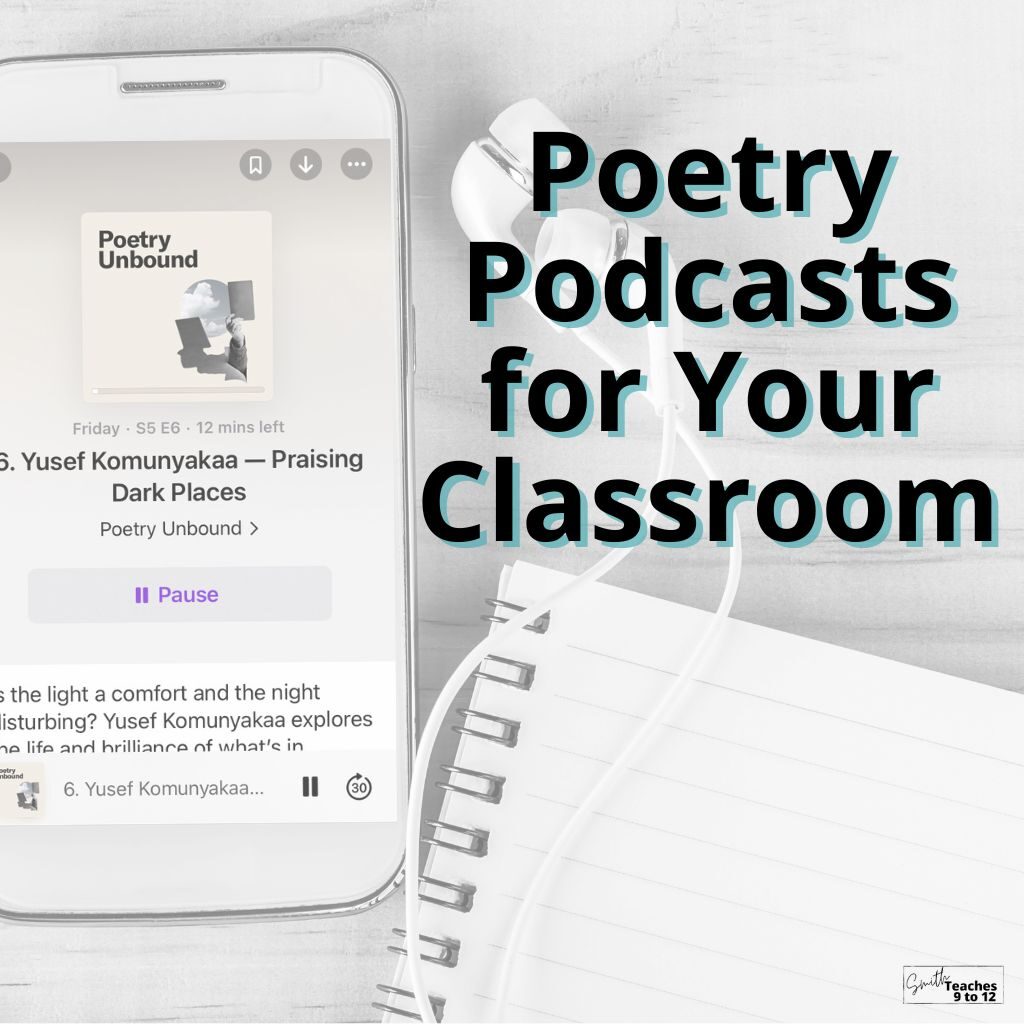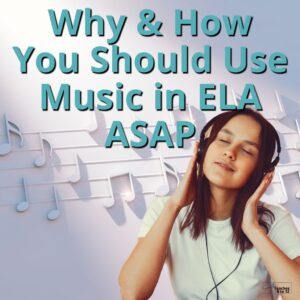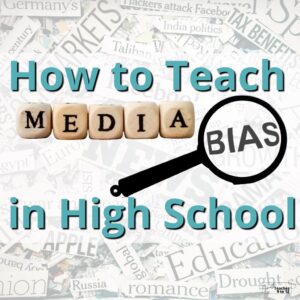Sharing is caring!
Podcasts are such a great addition to class as both fiction and non-fiction options. Many have used Serial or Lore in their high school classrooms, but have you considered using podcasts to showcase poetry? There are so many options to choose from that are available free online or through a variety of podcast apps. Read on for 6 poetry podcasts for your classroom!
Why use podcasts in your classroom?
In many ways, podcasts become just another text you can use in class to help students with a variety of skills. They’re also a way to differentiate with many podcasts providing both audio and transcripts. Poetry-focused podcasts in particular can make poetry more accessible for those who might be intimidated by the form. Hearing someone else read a poem and even, in some cases, provide some analysis can increase students’ comfort.
You can also use podcasts as another avenue for assessment. Listening or talking about podcasts can meet curriculum standards related to oral communication as well as listening and responding.
Finally, the poetry podcasts suggested below have added ‘bonuses’!
- There are many episodes so it offers students choice.
- These podcasts are shorter so they are a flexible, lower-commitment option; providing options for sampling rather than full immersion or investment into long episodes or a full series.
- Podcasts are a great choice when attendance might be hit or miss around holidays. This way you can explore literature and continue skill building without playing catch-up with curriculum when the class regroups.
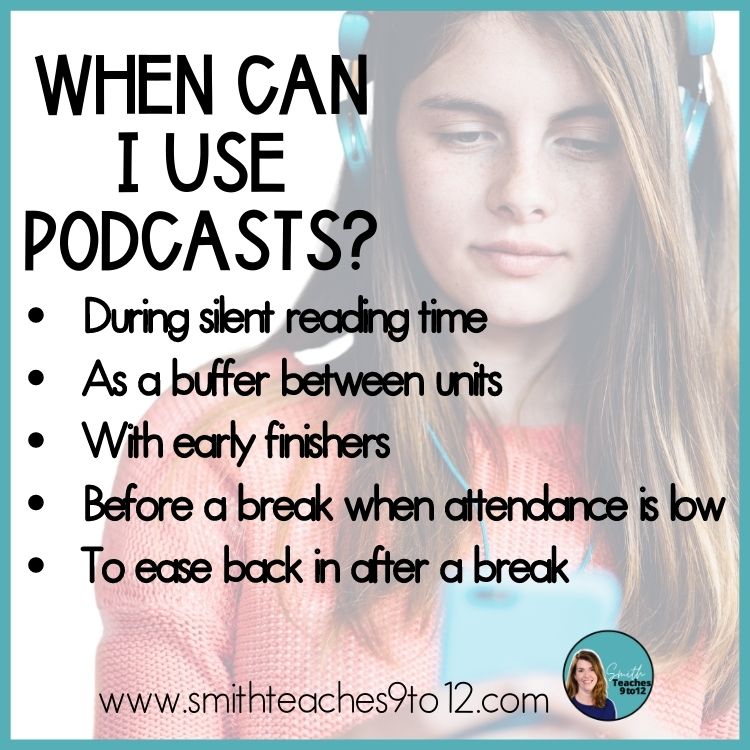
When to use podcasts?
Podcasts are a great addition to the ELA classroom but finding time and space for them can be tough.
These might be used as part of a weekly or bi-weekly minds-on or bell ringer activity, particularly for the shorter 1-5 minutes episodes. This could be throughout April for National Poetry Month or one day a month when poetry becomes part of the regular routine. This too would help to demystify poetry and help students with analysis of poetry plus other texts in class!
What to do with podcasts for your classroom?
Some options for using podcasts include using them as a way into discussion, a minds-on or bell ringer, or even a calming down-time activity.
But one of my favorite options is to adopt a literary circle approach!
Have a small group of students listen and read about one particular poem or poet. They can complete individually a one-pager about the best line, notable elements, figurative language devices used, and examine the rhyme or rhythm.
They can, as a small group, create a poster profile of their poem and share it with the class.
Turn it into a gallery walk of the poems to encourage students to listen to a different poem or series of poems.
Groups could rotate through a set of 5-6 poems over so many weeks. With their shared knowledge they can build on the profiles, create new ones, or mix-and-match for discussions too.
With each new poem their comfort will grow with poetry and so too will their skills with noticing and noting its elements.
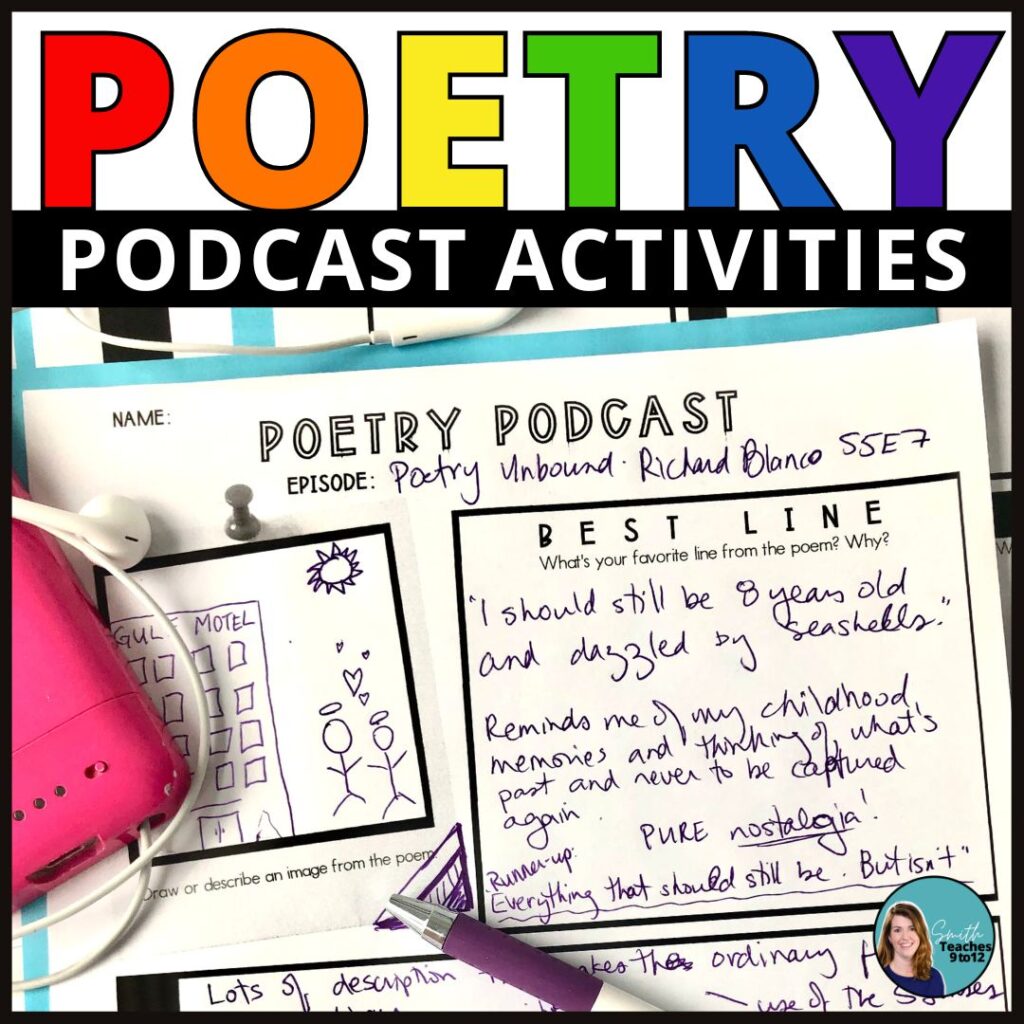
Have students create one-pagers or do a note-and-notice activity with different poems using these ready-made graphic organizer activities.
Poetry Podcast Suggestions
Here are six poetry podcasts that would work well for any high school English classroom.
Poetry Unbound, hosted by Padraig O Tuama, is far and away a favorite. Each episode spans about 10-20 minutes at most and there are two released each week. The show includes a reading of a poem – mostly contemporary poems – and then the host discusses the poem. He breaks down some of the big ideas, points out poetic devices or something noteworthy in the writing or form of the poem, and often speaks of the poet to provide some context to the work.
Poetry Now, from the Poetry Foundation, is a weekly podcast. Each 4-minute episode includes a contemporary poet that provides insight into a single poem.
Each episode also has a written transcript, which can help to differentiate for students. Also linked is some biographical information about the poet and a copy of the poem. There are 190+ back episodes, which can offer a wide variety of choices for you or your students.
Voicemail Poems has short episodes that are under 5 minutes and they feature poems people have called in and left as voicemails. These voicemails contain random poems from random people. The highlight of these episodes is that they can reduce the common inaccessibility of poetry; these episodes show that anyone can be a poet! To be sure there are good ones and bad ones but so too is the case for published ‘classic’ poems!
The New Yorker: Poetry is a conversation between host Kevin Young and a contemporary poet. Each episode is a conversation with a poet about a poem they’ve chosen to share. Each episode is about 30 minutes in length and can lead to great discussion in class. Recent episodes have featured Sandra Cisneros, Saeed Jones, and Amanda Gorman.
To differentiate for students, each episode has a downloadable transcript.
Poem of the Day from Poetry Foundation and Poem-A-Day from American Society of Poets each feature exactly that a poem each day from their archives. This includes contemporary and classic poetry. The poems are often chosen to reflect the season or specific months of significance.
For both, you can listen to the poems on most platforms where you’d access podcasts or they’re also available directly on their website. A great aspect of accessing from the website is that the audio is linked to a published poem, so it’s easy to share the text while listening to the recitation.
The Slowdown is hosted by past and present Poet Laureates Tracy K. Smith and Ada Limón and features a contemporary poem recited by the host. A brief introduction to the poem focuses on a key moment or idea of writing poetry that connects with the day’s poem. With more than 750 poems shared over the past four years, there are plenty of options to choose from.

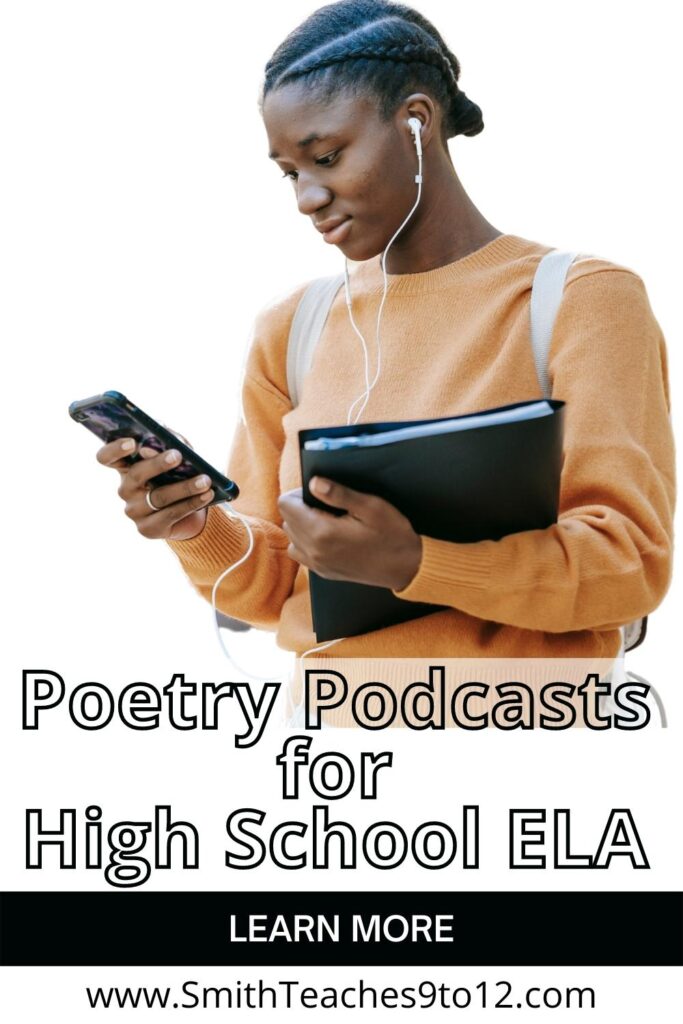
Related articles
- 3 Podcasts for Career Exploration for High School Students
- 3 Podcasts That Work For ELA from Missy at A Better Way to Teach
- 3-2-1 Strategy for High School English from Jeanmarie at McLaughlin English
Do you have any podcast suggestions, poetry or otherwise, to use in ELA? Share in the comments below or on instagram!

